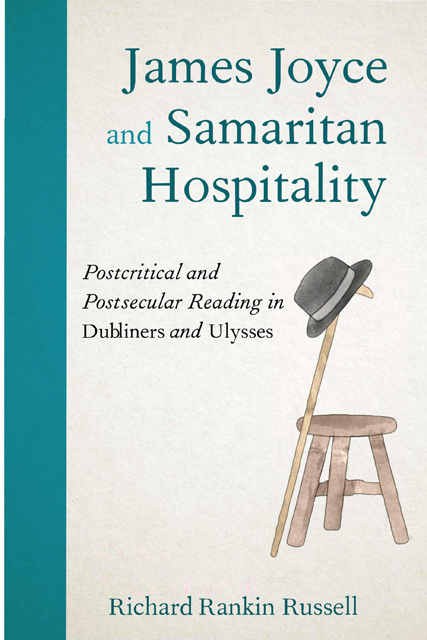Book contents
- Frontmatter
- Contents
- Preface and Acknowledgments
- List of Abbreviations
- Introduction
- 1 Haunted by Hospitality in “The Dead”
- 2 Joyce, Scripture, and Autobiographical Rescue Narratives
- 3 Rewriting the Good Samaritan Parable: The Fictional Rescue Narratives of “Grace” and “Circe”
- 4 Bloom as Stranger and Samaritan in “Cyclops,” “Oxen of the Sun,” and “Circe”
- 5 “In orthodox Samaritan fashion”: The Parabolic Encounter between Stephen and Bloom in “Eumaeus”
- 6 Home to “Ithaca” and “Penelope”: Bloom’s Hospitality and Stephen and Molly’s Reactions
- 7 Enfleshed Ethics and the Responsibility of the Reader in the Good Samaritan Parable and the “Nostos” of Ulysses
- Coda: “Go thou and do likewise”: Postcritical and Postsecular Reading through a Joycean Hermeneutics of Hospitality
- Works Cited
- Index
Preface and Acknowledgments
Published online by Cambridge University Press: 25 April 2023
- Frontmatter
- Contents
- Preface and Acknowledgments
- List of Abbreviations
- Introduction
- 1 Haunted by Hospitality in “The Dead”
- 2 Joyce, Scripture, and Autobiographical Rescue Narratives
- 3 Rewriting the Good Samaritan Parable: The Fictional Rescue Narratives of “Grace” and “Circe”
- 4 Bloom as Stranger and Samaritan in “Cyclops,” “Oxen of the Sun,” and “Circe”
- 5 “In orthodox Samaritan fashion”: The Parabolic Encounter between Stephen and Bloom in “Eumaeus”
- 6 Home to “Ithaca” and “Penelope”: Bloom’s Hospitality and Stephen and Molly’s Reactions
- 7 Enfleshed Ethics and the Responsibility of the Reader in the Good Samaritan Parable and the “Nostos” of Ulysses
- Coda: “Go thou and do likewise”: Postcritical and Postsecular Reading through a Joycean Hermeneutics of Hospitality
- Works Cited
- Index
Summary
The inspiration for this book emerged from a graduate seminar on Yeats and Joyce that I taught at Baylor University in the fall semester of 2016. After spending half the semester on Yeats’s poetry, drama, and prose, we spent the second half on Joyce, reading A Portrait of the Artist as a Young Man and Ulysses. Turning back to Ulysses is always a daunting task, and as always, I felt compelled to rehearse others’ arguments about the novel while admitting I had few original readings of my own. Valid as some of those established readings are, I found myself wishing for a new theory that would illuminate the novel for my students and myself. Late that semester, when we started the “Nostos,” or last three episodes, I discovered my entrée. It comes in the first sentence of “Eumaeus,” the sixteenth episode: “Preparatory to anything else Mr Bloom brushed off the greater bulk of the shavings and handed Stephen the hat and ashplant and bucked him up generally in orthodox Samaritan fashion which he very badly needed” (U 15.1–3). I had always tended to distrust this circumlocutious narrator, who is not only long-winded but also vague and who fumbles to accurately convey conversation in this episode. What I realized for the first time after recognizing the reference this narrator makes to the Good Samaritan narrative as recounted in Luke 10:25–37 was that the narrator nonetheless can describe the actions in this episode clearly (and often does). Actions, then as now, still matter more than words for some of us, and Joyce chose to admiringly portray Leopold Bloom’s charitable actions at crucial moments earlier in the novel and especially beginning in the second half of “Circe,” the fifteenth episode, continuing through “Eumaeus” and “Ithaca.” A significant portion of that excessively long episode rendered as a sort of phantasmagoric expressionistic drama, I later realized, begins “staging” the Good Samaritan narrative that will be referenced in the opening sentence of “Eumaeus.” Later still, I would realize that Joyce dramatizes this parable in this crucial section of “Circe” in verbatim phrases and sentences he “recycled” from “Grace,” the penultimate story in his collection Dubliners.
- Type
- Chapter
- Information
- James Joyce and Samaritan HospitalityPostcritical and Postsecular Reading in Dubliners and Ulysses, pp. vi - ixPublisher: Edinburgh University PressPrint publication year: 2023



